| Newer Posts | Older Posts |
Selling A Home In An Under Supplied Segment Of The Market |
|
 Nobody needs to feel bad for a seller of a home in an under supplied segment of our local housing market. After all, they are likely to sell their house quickly, and for more than the list price. But...it's not all sunshine and roses... 2. These sellers practically ought to go on vacation for a few days as they are likely to be run out of their house from sun up to sun down with showings. 3. When the offers start pouring in, with touching introductory cover letters and heartfelt pleas from buyers to accept their offer, sellers will quickly realize that by saying "yes" to one buyer they will be saying "no" to quite a few others. On the bright side, though... 1. These types of homes are likely to go under contract quickly, ending the constant parade of buyers through the house. 2. The lucky winning buyer is likely to be gentle on any sort of repairs request as there will likely be multiple alternative buyers waiting in the wings if the primary buyers do not want to move forward based on the home inspection. 3. Homes in an under supplied segment of the market are likely to sell for more than the list price. So, it's not all good, but it is certainly NOT all bad to be selling in an under supplied segment of the local housing market! | |
Lots of Homes Selling (Going Under Contract) in September 2020 |
|
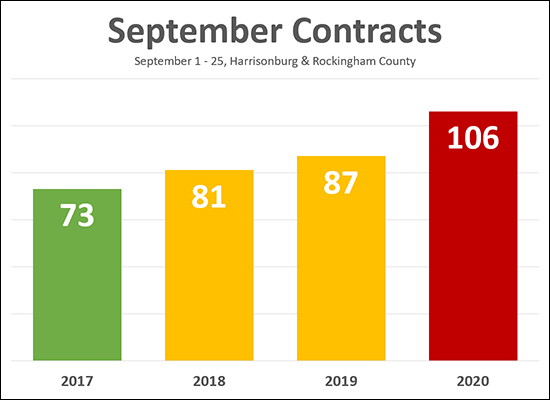 Buyer activity usually starts slowing down in September. After all -- spring is usually the busiest season for buying, followed by summer. But this September, buyer activity has been STRONG! As you can see, above, we have seen 73 to 87 contracts signed in the first 25 days of September during each of the past three Septembers. But this September -- there have been 106 contracts signed in the first 25 days of the month! Nothing has been normal this year, and September is proving to be no different. Home sales don't show any signs of slowing down yet this year! | |
Analyzing the Accuracy of Zillow Zestimates In Harrisonburg and Rockingham County |
|
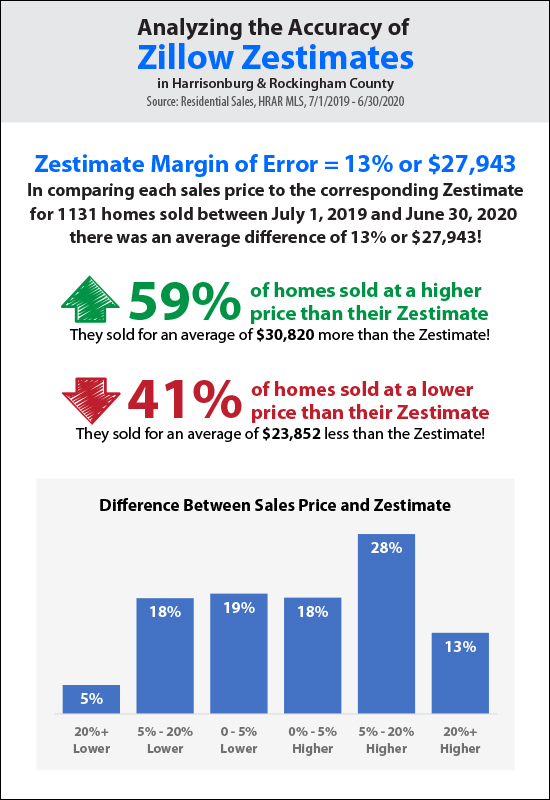 download the infographic above as a PDF Do homeowners enjoy checking out the Zillow Zestimate for their home? Yes Are Zestimates accurate indicators of market value of homes in some real estate markets? Yes, probably. Are Zillow Zestimates for properties in Harrisonburg and Rockingham County a good indicator of the price for which a home will sell? No, not at all. This used to just be a hunch, but now I can back it up with data. To answer this question...
As shown above...
So, as a homeowner thinking of selling your home... the Zestimate for your home might happen be accurate - but that would be the exception, not the rule. Only 37% of pre-listing Zestimates were within 5% of the final sales price of the houses. And as a home buyer thinking of buying a house... you shouldn't necessarily expect to only have to pay the Zestimate for a house, because those values are often too low... and yet you also shouldn't necessarily be willing to pay as much as the Zestimate for a house, because those values are often too high. In the end, just understand that the Zestimate for your home (in Harrisonburg and Rockingham County) is much more likely to be inaccurate than accurate. Presumably, you wouldn't want to make a decision about the asking price for your home with a value indicator that is on average 13% different than market value. That is an average of $27,943 -- and most sellers don't want to under-price or over-price their home by that much! | |
Where Do We Focus First? Selling Your Home? Or Buying The Next Home? |
|
 If you are getting ready to sell your home AND buy your home, it can sometimes be difficult to determine where to start... Do you start by finding a house you want to purchase? Or do you start by listing your home for sale? I would suggest that you start with whichever you anticipate will be the most difficult part of the two step process. If it will be difficult to sell your home (because of price, location, layout, features, age, etc.) and it will be at least slight easier to buy the next one (plenty of viable options are listed for sale) then you are likely best off starting with listing your home for sale. Work to get the more difficult half of the transition underway by getting your current home under contract, and then work on the easier side of the transition. If it will be more difficult to buy the next house (because of the specificity of your housing goals, or because of low inventory levels, etc.) and it will be at least slightly easier to sell your current home (because the property type, location or price are in high demand) then you are likely best off focusing first on finding the home to buy -- and then listing your home for sale. There are plenty of nuances we can discuss further to formulate a plan for attempting to simultaneously sell and buy -- but as a general rule of thumb, you'll be best off to start with the harder half of the transaction. | |
City of Harrisonburg Home Sales Slow But Prices Rise |
|
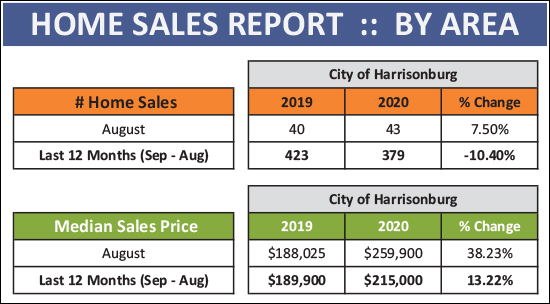 Focusing in just on the City of Harrisonburg for a moment... Home Sales Slow -- There have only been 379 home sales in the past 12 months in the City of Harrisonburg, as compared to 423 home sales in the previous 12 months. This is a 10.4% year-over-year decline in home sales activity in the City. Prices Rise Sharply -- The median price of the homes sold in the past 12 months was $215,000 which is 13.22% higher than one year ago when it was $189,900. What does it all mean?
Are you looking to buy, or sell, in the City of Harrisonburg? Feel free to touch base with me if I can be of any help to you. You can reach me at scott@hhtdy.com or via phone/text at 540-578-0102. | |
Harrisonburg vs Rockingham County Inventory Levels |
|
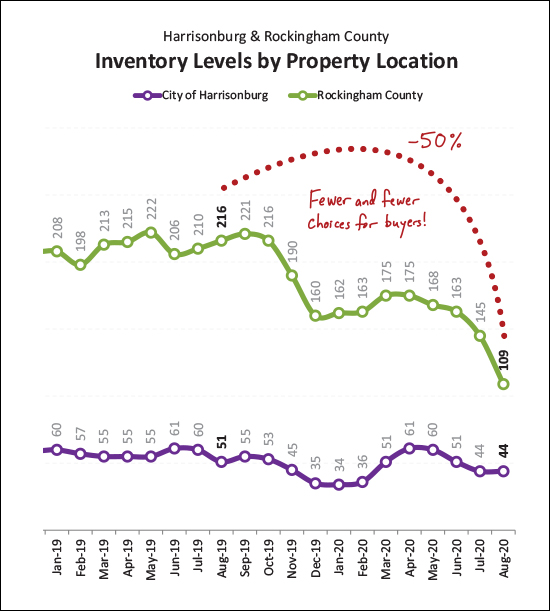 Perhaps the City inventory levels were just so low that they didn't have far to fall? Multiple things to note here (above) regarding City vs. County inventory levels...
In theory, inventory levels might (???) start to climb a *bit* this fall, but my general sense is that there is still pent up buyer demand and inventory levels could stay this low all through the fall and winter. Sorry, buyers! :-/ | |
Only 1 in 10 Home Buyers Spends More Than $400K |
|
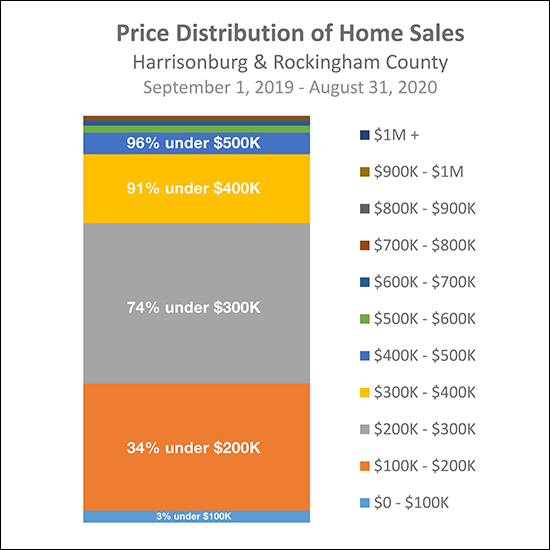 Lots to observe / conclude here...
| |
Is It Time To Adjust The List Price Of Your Home? |
|
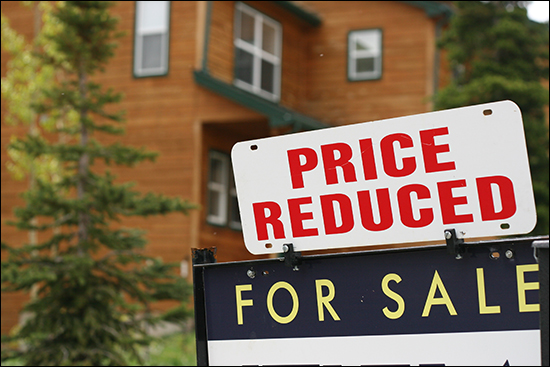 We should have another solid 60 days (maybe 75) of strong buying activity (contracts being signed) during September and October before things start to slow down in November - and then really slow down in December and January. If you are intent on selling your home before the end of the year, you may want to consider a price reduction now, rather than later. If you reduce your list price next Monday -- on September 7th -- you likely have a good 60 - 75 days of exposure to a larger pool of buyers before contract activity slows down. If you wait, and reduce your price on November 15, you have already had a large number of buyers pass your house by - and we'll be rolling into Thanksgiving and then Christmas. Think strategically about how your house is priced to best position it to realistically be under contract within a timeframe that best works for you. | |
Home Buyers Went Bananas In August 2020 |
|
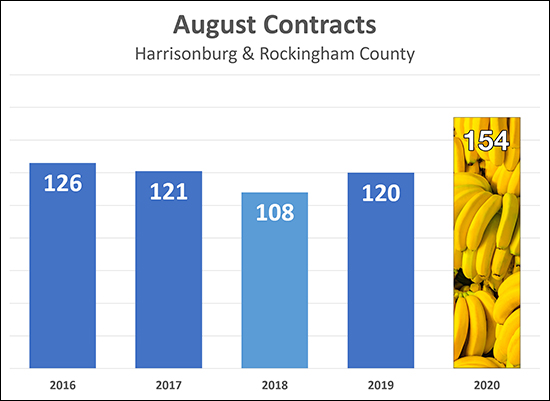 A little later this month I'll take a thorough look at all of the home buying (and selling) activity in Harrisonburg and Rockingham County. But before we get there - I thought I'd take a quick peek at how many buyers (and thus, sellers) signed contracts in August 2020. I was surprised to see a BIG increase in August contract activity as compared to the month of August in each of the past four years! Buyers still seem to be out in full force, ready to pursue houses as they hit the market for sale. It seems this fall might be busier than usual in our local housing market! | |
There Are Not Necessarily Always Buyers For All Homes Ready To Buy At All Times |
|
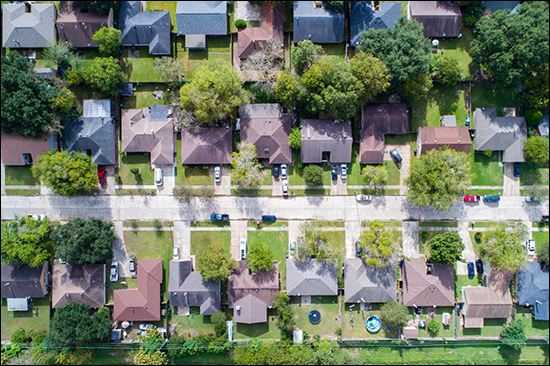 If you are preparing your house well for the market - and pricing it appropriately, according to what other buyers have recently paid for similar houses - and the house is marketed fully and professionally...it should be under contract relatively quickly, and certainly within the first 30 days, right? Well... maybe... Sometimes, it just takes time. In the end, if the right buyer is not in the market right now, then it might not sell until the right buyer is ready to buy - and we shouldn't necessarily expect that the wrong buyer will buy your house just because it is prepared well, priced well and marketed well. Understanding how these dynamics will affect you and your listing is highly related to how many buyers are in your price range -- and in that pool of buyers in your price range, is your house likely to meet the needs of only a few, many or most of the buyers. So, if your home has been on the market for 30 days, or 60 or 90 or 120 or more days -- we should be thinking about...
If the answer is yes, yes and yes -- then we'll be left with two options...
| |
How Should A Home Seller Actually Interpret Buyer Feedback? |
|
 As a home seller, if you didn't get a contract within a few days of your house being listed for sale, you may continue to face rejection left and right -- some prospective buyers will come view your house and most of them will decide not to buy it. But how, as a seller, do you make sense of that feedback?
I often hear the following types of feedback after a showing:
This type of feedback (size, location, floor plan) is difficult to do much with as a seller. You likely aren't going to build an addition to your house, nor will you physically move the house, nor will you reconfigure the floor plan. Sometimes the feedback is just a mild objection to be overcome -- did you realize that the unfinished bonus room could be finished quite inexpensively (size) and that the new South East connector will make your commute quite short (location)? Oftentimes, however, if you receive feedback about size, location or floor plan there isn't much you can do about it as a seller. I also, however, will hear the following types of feedback after a showing:
This type of feedback (price, condition, marketing) is completely in your control as a seller. Many buyers will not make an offer if they think your list price is too far from reality -- adjusting your pricing may be just what you need to either generate more showings, or have a chance of the showings turning into offers. I almost included AGE as a factor outside of a seller's control, but it's much more about condition -- how well has a property been maintained, and is it in top showing shape so that buyers don't feel overwhelmed by short-term cosmetic updates and long-term maintenance needs? Finally, if a house has not been marketed thoroughly and effectively, it will likely have a much longer "days on market" than other properties, worrying buyers that perhaps they shouldn't buy the home because nobody else has in the last ten months. Read more about, think more about, and learn more about selling your house at SellingAHomeInHarrisonburg.com. | |
How Far Can You Or Should You Round Up The List Price For Your Home? |
|
 Sometimes it is tempting for a seller to want to round up their list price. The seller says (or thinks)... "We think the house is worth $240K? And you're saying we should list it for $245K or $249K? I'm optimistic -- I think someone is going to be willing to pay $250K, so let's list it for $260K! A buyer can always make an offer!" That's all well and fine and good -- and somewhat logical -- unless every buyer that comes to see the house in the first three weeks really thinks it is worth $240K. Then, when leaving the house priced at $260K, if they are willing to pay $240K, they are likely thinking they'd need to offer $220K in order to negotiate you down to the value of $240K. And they almost certainly won't make the offer. If a house priced at $260K has been on the market for a few days, most buyers aren't going to make an offer of $220K. They might think it is a waste of their time. They might not want to insult the seller. Regardless of the reason, you are not likely to have $220K offers on a $260K listing within the first few weeks. Thus, the buyer who excitedly came to see your $260K house, and then concluded that it is probably worth $240K (where we started this conversation) is likely to conclude that they should just wait a month or so and see if you eventually reduce the price to $250K -- and then they might consider an offer. But by the time you reduce the price to $250K, you are bound to get significantly less buyer/market attention with that price reduction since it is no longer a new listing. And some of the originally interested buyers will have found something else to buy. And there will be much less urgency for any buyer to make a decision about an offer. | |
Buyers Seem To More Frequently Be Willing To Pay Above Appraised Value For Houses |
|
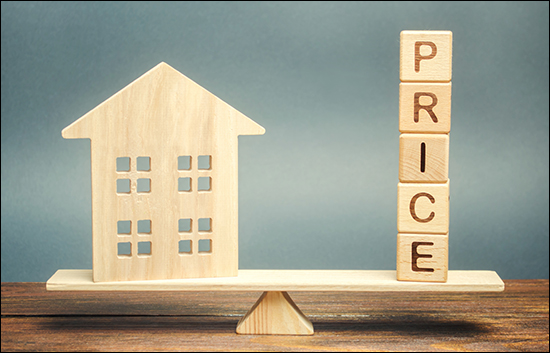 In today's local housing market we're seeing...
This disconnect (buyers being willing to pay more than appraised value) is likely because of how appraisals are defined and conducted. An appraisal is an indication of the value of a property based on what other buyers have paid for other similar houses in the recent past - often the last six months. What we now seem to be seeing is that today's buyers are willing to pay more for houses than buyers paid zero to six months ago - which can cause an appraisal to come in lower than the price that the buyer had agreed to pay for the house. So, when there is a low appraisal, where do things go from there? It's different in every transaction and it's all negotiable.
If the appraisal on your house comes in low...
Current conditions in your segment of the local housing market will likely ultimately dictate what a buyer and seller will agree to do with a low appraisal. | |
Should You Be Surprised If Your Home Sells At Or Above List Price? |
|
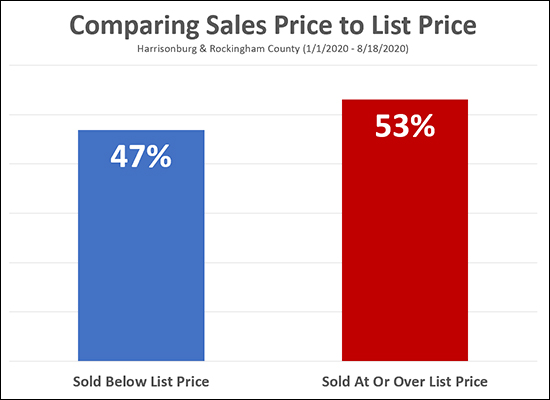 No. You should not be surprised if your home sells at or above the list price. As shown above, 53% of homes that have sold thus far in 2020 have sold at or over their list price. It's a sign of the times, I suppose. There are LOTS of buyers fighting over very few homes for sale and this often leads to...
Just to put this in context, let's see how things looked three short years ago... 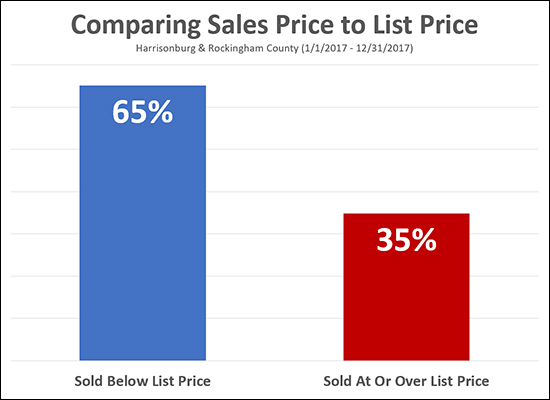 Things were quite a bit different in 2017, it seems! Way back in 2017 only about a third of homes sold at or above their list price! As with many other recent market indicators, this is great news for sellers and rather unexciting news for buyers. | |
Home Buyers And Sellers Made Up For Lost Time In June, July |
|
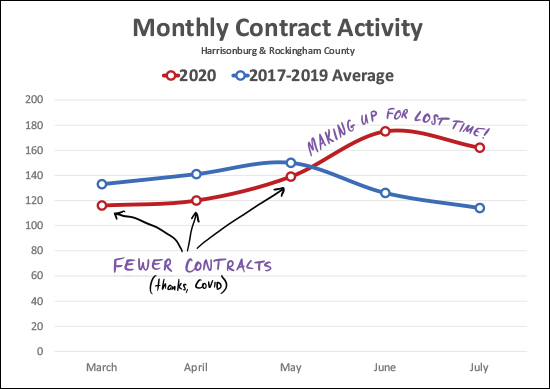 Well - hello June and July! The red line above shows the number of contracts signed for each of the past five months. The blue line shows the average number of contract signed in that same month during 2017, 2018 and 2019. Basically, comparing the monthly pace and pattern of 2020's contract activity to the three most recent years to see if this is what we should have expected. It's not what we should have expected. Typically, contract activity peaks in May and then slowly declines in June and July. But not this year. During 2020, contract activity was lower than would have been expected in March, April and May -- but then -- wow! Thinks really started to move in June and July. All in all, I think this is the impact of COVID. It slowed the local housing market down for a few months, but things are speeding right back up to likely eventually catch up to where we were last year. Stay tuned to see what happens come August... | |
The Floor Plan Or Layout Of Your House Can Make Or Break The Sale |
|
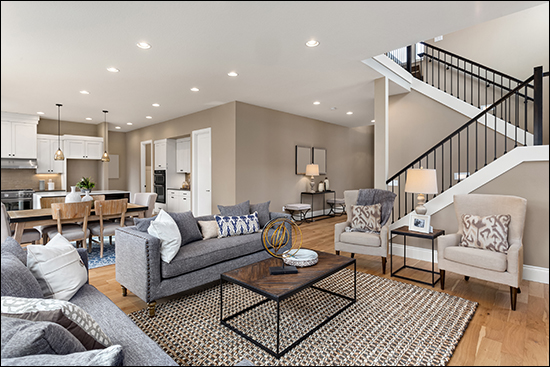 If a buyer is buying over $400K, or even over $300K, the layout of the home becomes very important to them. That is not to say that it is unimportant for a $200K buyer -- but someone buying a more expensive home oftentimes plans to stay in it for a longer time frame. If not the #1 feedback, then perhaps the #2 feedback I receive from showings of homes priced over $400K is that the layout just didn't work for the buyers....
| |
How To Run The Numbers On Upgrading To A New Home |
|
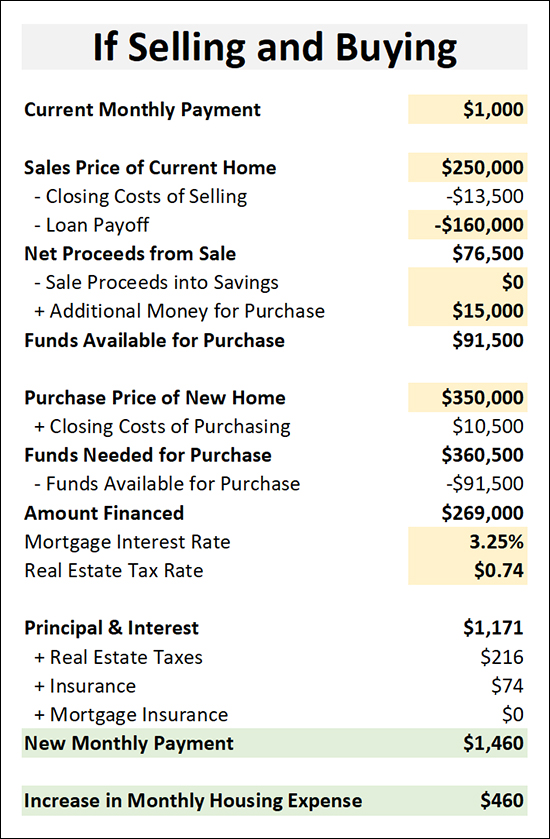 If you will be selling your home to buy another, there are a lot of numbers floating around....
Above you will see a spreadsheet I put together to help you think about some of these numbers as you are evaluating if and when you will make a move to a new house. In yellow, are all of the inputs you will need to provide, or that you and I can determine together, such as your current payment, your home's current value, your mortgage payoff, whether you will be putting any additional money into the transaction, etc. In green, I have identified your potential future mortgage payment and the net change in your monthly payment. All of the numbers without a background color will automatically calculate for you. Click here to download this worksheet as an editable Excel file. | |
Preparing To Sell? A Messy (aka normal) House Is Just Fine When We Meet! |
|
 So, you're thinking about selling your home? And we're getting ready to meet? I'm swinging by your house tomorrow morning to walk through it together and to talk about the process, the market, etc.? Don't stay up all night cleaning on my account! There are plenty of times when I will want your house to be absolutely spotless, 100% organized, de-cluttered, picked up, minimalized (probably not a word), etc. For example...
But did you notice what is not on that list?
Some sellers feel pressure to have their house in absolutely tip top shape before we set up our first time to meet at your house to discuss your house, the market, the selling process, etc. You do not need to feel that pressure. I can look past the way that you (and most people) live everyday life - which is just not quite as 100% polished and put together as when your house is on the market. So -- if you want to get your house all the way to the point where it is ready for photos and showings before you have me over to start a conversation about your potential home sale, that is just fine -- but it is not my expectation that you do so. Talking early and often about selling (When should we list? What should we do before listing? What price expectations should we have?) can be very helpful for most home sellers. | |
How To Measure The Square Footage Of Your Home |
|
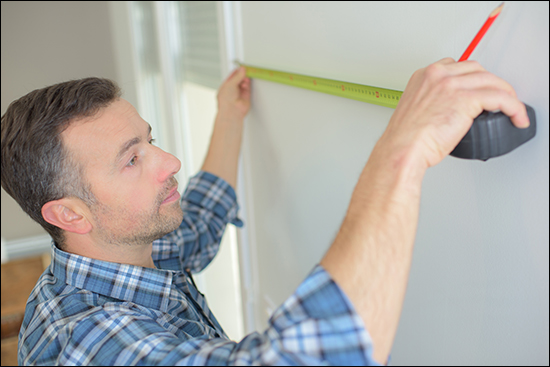 So -- are you trying to figure out the square footage of your home? Here are a few methods that are NOT necessarily going to give you the correct answer....
So, how do you really measure square footage? It starts outside the home! You'll need to measure the exterior dimensions of each level of your home -- and then subtract any open areas, such as the open space above a foyer. This measurement method, as odd as it may be, is what is used by nearly every appraiser, as it is how "gross living area" is defined by Fannie Mae, HUD, FHA, ERC and ANSI. As such, it is important that you're measuring the square footage of your home in the same way that nearly every appraiser and Realtor would be measuring it, so that you're comparing apples to apples when comparing the size (SF) of your home to another home that has sold or that is on the market for sale. And here's why I consider it to be an odd way to measure square footage....
| |
Why Is This Home Being Sold In AS IS Condition? |
|
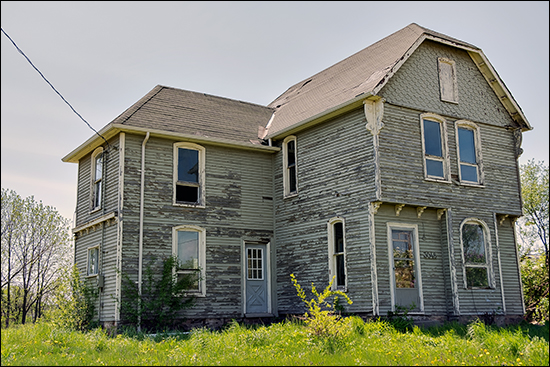 Sometimes a seller is stating this as soon as they list a property: All inspections are for informational purposes only. or This house is being sold in "as is" condition. Here are the top three innocent reasons why a seller would want a home inspection to be for informational purposes only....
| |
| Newer Posts | Older Posts |
Scott Rogers
Funkhouser Real
Estate Group
540-578-0102
scott@funkhousergroup.com
Licensed in the
Commonwealth of Virginia
Home Search
Housing Market Report
Harrisonburg Townhouses
Walk Through This Home
Investment Properties
Harrisonburg Foreclosures
Property Transfers
New Listings

